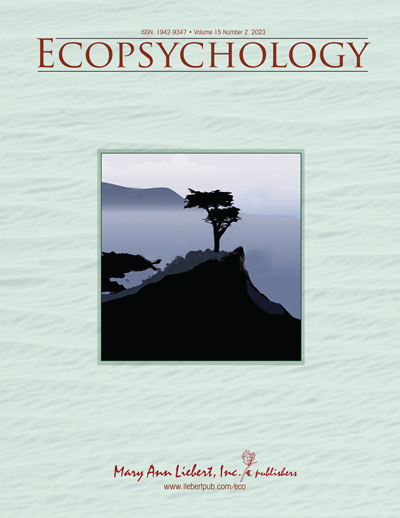Announcements
-
RFS Awards in Science Winner
Mary Ann Liebert, Inc., in partnership with the Rosalind Franklin Society launched a prestigious annual award to recognize outstanding published peer-reviewed research by women and underrepresented minorities in science in each of the publisher’s peer-reviewed journals. The RFS Awards in Science for Ecopsychology has selected Natalia Calderón Moya-Méndez, MPhil who co-authored Going Beyond the Instrumental View on Nature and the Human–Nature Relationship: Visions of Nature of the Metropolitan Population of Lima, Peru.
Aims & Scope
Ecopsychology is the only peer-reviewed journal that places psychology and mental health in an ecological context to recognize the links between human health, culture, and the health of the planet. The Journal seeks to reshape modern psychology by showing that it cannot stand apart from an intimate human connection with the natural environment. We need that connection with nature to do well mentally and physically, let alone to flourish, as individuals and as a species. Against this backdrop, the Journal publishes original scientific research articles, as well as theoretical papers, case studies, nature writing, and reviews of important books and other media.
Ecopsychology coverage includes:
- Physical and mental health benefits of interacting with nature
- Biophilia
- Ecotherapy
- The psychology of environmental destruction
- Science, technology, and the depth of experience with nature
- The rediscovery of the wild
- Urban sustainability
- Indigenous cultures
- Responsibility for protecting natural places and other species
- Human-animal interaction
Ecopsychology is under the editorial leadership of Editor-in-Chief Peter H. Kahn Jr., University of Washington, Department of Psychology, and other leading investigators. View the entire editorial board.
Audience: Everyone who self-identifies as an ecopsychologist, as well as those with congruent sensibilities but who primarily identify in other disciplines, including environmental educators, conservation psychologists, therapists, environmental philosophers, nature writers, nature advocates and guides, healthcare providers, urban planners, and architects; among others
Indexing/Abstracting:
- Web of Science: Emerging Sources Citation Index™ (ESCI)
- Scopus
- Current Contents®/Life Sciences
- PsycINFO
- GreenFILE
- BenchSci

